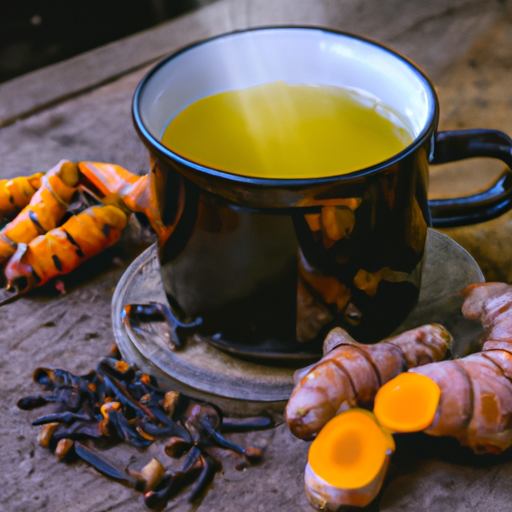Turmeric tea has gained popularity in recent years due to its numerous health benefits. However, it’s important to note that while turmeric tea can be beneficial for many people, there are certain situations where it may not be suitable.
In this article, I will discuss when you should avoid drinking turmeric tea.
First and foremost, it’s crucial to consider pre-existing medical conditions. Turmeric has blood-thinning properties, so if you have a bleeding disorder or are taking blood thinners, it’s best to avoid consuming turmeric tea as it may increase the risk of bleeding.
Additionally, if you have allergies or sensitivities to turmeric or any of its components, it’s wise to steer clear of turmeric tea to prevent any adverse reactions.
Pregnant or breastfeeding women should also exercise caution. While turmeric is generally considered safe in small amounts, it’s best to consult with a healthcare professional before consuming turmeric tea during these times.
Furthermore, if you are scheduled for surgery or are in the recovery phase, it’s advisable to avoid turmeric tea as it may interfere with blood clotting and impact the healing process.
It’s also important to be aware of potential interactions with medications. Turmeric can interact with certain medications, including blood thinners, antiplatelet drugs, and antacids, so it’s crucial to consult with your healthcare provider before incorporating turmeric tea into your routine.
Lastly, if you have digestive issues such as gallbladder problems or gastroesophageal reflux disease (GERD), turmeric tea may exacerbate these conditions and should be avoided.
In conclusion, while turmeric tea offers numerous health benefits, it’s essential to be mindful of these situations where it may not be suitable. Always consult with a healthcare professional to determine if turmeric tea is right for you, especially if you have any pre-existing medical conditions, allergies, or are on medications.
Key Takeaways
- Turmeric tea should be avoided by individuals with bleeding disorders or those taking blood thinners.
- Pregnant or breastfeeding women should consult with a healthcare professional before consuming turmeric tea.
- Turmeric tea may interfere with blood clotting and the healing process during surgery or recovery.
- Turmeric tea may exacerbate digestive issues such as gallbladder problems or GERD.
Pre-existing Medical Conditions
If you have pre-existing medical conditions, you shouldn’t drink turmeric tea. While turmeric has been praised for its numerous health benefits, it isn’t suitable for everyone. It’s important to consider how certain conditions may interact with the properties of turmeric and potentially worsen your symptoms or interfere with medications.
Individuals with pre-existing medical conditions such as gallbladder disease, kidney stones, and bleeding disorders should exercise caution when consuming turmeric tea. Turmeric contains compounds that may stimulate bile production, which can be problematic for those with gallbladder disease. Additionally, turmeric is known to increase the production of oxalates, which can contribute to the formation of kidney stones. People with bleeding disorders should also avoid turmeric tea, as it may inhibit blood clotting and increase the risk of bleeding.
Moreover, personal preferences also play a role in determining whether turmeric tea is suitable for you. Some individuals may experience gastrointestinal discomfort, such as heartburn or stomach upset, after consuming turmeric. It’s essential to listen to your body and discontinue turmeric tea if you experience any adverse effects.
Moving forward to the next section about allergies and sensitivities, it’s crucial to be aware of potential reactions that may arise from consuming turmeric tea.
Allergies and Sensitivities
Avoid consuming turmeric tea if you have any allergic reactions or sensitivities. Turmeric contains a compound called curcumin, which is responsible for its vibrant color and potential health benefits. However, some individuals may experience allergic reactions or sensitivities to curcumin or other components of turmeric. Allergic reactions can range from mild symptoms like itching and hives to more severe reactions like difficulty breathing or anaphylaxis. It is important to be aware of any known allergies or sensitivities before incorporating turmeric tea into your diet.
In some cases, individuals with known allergies or sensitivities to other plants in the same family as turmeric, such as ginger or cardamom, may also experience cross-reactivity to turmeric. Cross-reactivity occurs when the immune system reacts to similar proteins found in different substances. Therefore, if you are allergic to ginger or cardamom, it is advisable to avoid turmeric tea as well.
To provide a comprehensive overview, here is a table summarizing common allergic reactions and potential cross-reactivity associated with turmeric:
| Allergic Reactions | Cross-Reactivity |
|---|---|
| Itching and hives | Ginger, Cardamom |
| Difficulty breathing | |
| Anaphylaxis |
Moving on to the next topic of pregnancy and breastfeeding, it is important to consider the safety of consuming turmeric tea during these periods.
Pregnancy and Breastfeeding
When it comes to pregnancy and breastfeeding, it’s important to consider the potential effects of drinking turmeric tea.
While there is limited research on the subject, some studies suggest that consuming large amounts of turmeric during pregnancy may have negative effects on fetal development.
Additionally, there is a lack of research on the safety of turmeric tea during breastfeeding, so it’s best to err on the side of caution and consult with a healthcare professional before consuming it.
Potential effects on pregnancy
Turmeric tea may have potential effects on pregnancy, so it’s important to be aware of its possible risks. While turmeric has been used for centuries for its medicinal properties, its impact on pregnancy is still not fully understood.
Some studies suggest that consuming large amounts of turmeric tea may interfere with fertility and the menstrual cycle. However, more research is needed to determine the exact effects and safe dosage levels during pregnancy. It is always recommended to consult with a healthcare professional before consuming any herbal tea, including turmeric tea, during pregnancy.
Moving forward, it’s crucial to address the lack of research on the effects of turmeric tea during breastfeeding to ensure the safety of both the mother and the baby.
Lack of research on breastfeeding
Unfortunately, there’s a lack of research on how turmeric tea may affect breastfeeding moms and their little ones. It’s important to note that while some studies suggest that turmeric may have health benefits, there isn’t enough evidence to determine its safety during breastfeeding. Here are some potential risks that should be considered:
-
Allergic reactions: Turmeric contains curcumin, which may cause allergic reactions in some individuals. Breastfeeding moms should be cautious if they have a known allergy to turmeric or related plants.
-
Blood thinning effects: Turmeric has natural blood-thinning properties, which could increase the risk of bleeding in breastfeeding moms.
-
Digestive issues: Turmeric may cause digestive issues such as diarrhea or upset stomach in both breastfeeding moms and their infants.
-
Interference with medications: Turmeric may interact with certain medications, so it’s important to consult a healthcare professional before consuming it.
-
Contamination: Turmeric products may be contaminated with heavy metals or other harmful substances, which can be harmful to both mom and baby.
Transitioning to the subsequent section about ‘surgery and recovery’, it’s important to consider the potential risks and lack of evidence surrounding the use of turmeric tea during breastfeeding.
Surgery and Recovery
For optimal healing after surgery, it’s best to avoid drinking turmeric tea. While turmeric has been praised for its potential health benefits, including its anti-inflammatory properties, there is limited research on its effects specifically on surgical recovery. Surgical risks and post-operative complications are already a concern, and introducing turmeric tea into the mix could potentially complicate matters further.
During surgery, there are risks involved such as bleeding, infection, and poor wound healing. Turmeric, being a natural blood thinner, could increase the risk of bleeding during and after surgery. Additionally, it may interfere with the body’s natural healing process, leading to delayed wound healing and increased post-operative complications.
Furthermore, turmeric may interact with medications commonly prescribed after surgery. For example, turmeric has been shown to inhibit the activity of certain enzymes responsible for metabolizing medications. This could result in higher levels of the medication in the body, potentially leading to adverse effects or decreased efficacy.
To ensure a smooth recovery and minimize any potential risks, it’s advisable to avoid consuming turmeric tea before and after surgery. However, it’s important to consult with your healthcare provider for personalized advice and guidance tailored to your specific situation.
Transitioning into the subsequent section about medication interactions, it’s crucial to be aware of potential interactions between turmeric and other medications that may be prescribed during your recovery.
Medication Interactions
When it comes to turmeric tea, it’s important to be aware of its potential interactions with certain medications. Some medications, such as blood thinners and stomach acid reducers, may be affected by the active compounds in turmeric.
It’s always a good idea to consult with a healthcare provider before incorporating turmeric tea into your routine, especially if you take any medications on a regular basis. They can provide guidance on any potential interactions and ensure it’s safe for you to consume turmeric tea.
Interference with certain medications
Ironically, drinking turmeric tea while taking certain medications can potentially interfere with their effectiveness. Turmeric contains compounds that can prevent blood clotting, which can be beneficial for some individuals. However, this property can pose a problem for those taking blood thinners like warfarin or aspirin, as it may increase the risk of bleeding. Additionally, turmeric is metabolized by the liver, and some medications are also processed by this organ. Consuming turmeric tea while on liver medications, such as statins or antifungal drugs, may hinder their metabolism and reduce their efficacy. To illustrate the potential interactions between turmeric tea and medications, refer to the table below:
| Medication | Potential Interaction |
|---|---|
| Blood Thinners | Increased risk of bleeding |
| Liver Medications | Reduced effectiveness |
| Other Medications | No significant interactions |
Considering these potential interactions, it is crucial to consult with a healthcare provider before incorporating turmeric tea into your daily routine.
Consultation with healthcare provider
To ensure your safety and optimize the effectiveness of your medications, it’s essential to consult with your healthcare provider before incorporating turmeric tea into your daily routine.
Consulting with your healthcare provider will provide you with several benefits. First, they can evaluate your specific medical condition and determine if turmeric tea is safe for you. They can also assess any potential interactions between turmeric and your medications, ensuring that there aren’t any negative effects.
Additionally, your healthcare provider can suggest alternative options if turmeric tea isn’t suitable for you. They may recommend other natural remedies or adjustments to your current treatment plan that can effectively address your health concerns.
By consulting with your healthcare provider, you can make informed decisions about incorporating turmeric tea into your routine.
Moving forward, let’s now discuss the potential impact of turmeric tea on digestive issues.
Digestive Issues
Turmeric is known for its potential impact on digestion, and as someone who’s knowledgeable about this topic, I can confidently say that it’s been shown to have positive effects.
Studies have indicated that turmeric can help alleviate symptoms of digestive issues such as bloating and indigestion. However, it’s important to note that for individuals with certain gastrointestinal conditions, turmeric may potentially aggravate their symptoms.
Turmeric’s impact on digestion
However, consuming excessive amounts of turmeric tea can potentially disrupt the digestive system. While turmeric has been praised for its numerous health benefits, it’s important to consume it in moderation. Turmeric’s effect on weight loss has been studied extensively, and it’s been found to aid in weight management by increasing metabolism and reducing fat tissue. Additionally, turmeric has shown potential in improving liver health by reducing inflammation and promoting detoxification.
However, consuming too much turmeric tea can lead to digestive issues such as stomach upset, bloating, and diarrhea. It’s important to listen to your body and not exceed the recommended dosage.
In the next section, we’ll explore how excessive consumption of turmeric tea can potentially aggravate gastrointestinal conditions.
Potential aggravation of gastrointestinal conditions
If you’re sailing through rough seas with an already delicate stomach, be cautious of the potential storm that excessive turmeric tea may brew. While turmeric tea is generally considered safe for digestion, it can have side effects, especially when consumed in large amounts.
Some individuals may experience gastrointestinal discomfort, such as bloating, gas, or diarrhea, after drinking excessive amounts of turmeric tea. Additionally, for individuals with ulcers or other gastrointestinal conditions, turmeric tea may aggravate their symptoms. It’s important to note that these side effects aren’t common and may vary from person to person. However, if you have a sensitive stomach or a known gastrointestinal condition, it’s advisable to consult with a healthcare professional before incorporating turmeric tea into your routine.
Transitioning into the subsequent section about personal preferences and taste, it’s important to find a balance between the potential benefits and any potential discomfort that turmeric tea may bring.
Personal Preferences and Taste
One great thing about turmeric tea is that you can customize it to suit your personal preferences and taste. It allows you to experiment with different flavors and ingredients, making it a versatile and enjoyable beverage. Whether you prefer a strong and spicy flavor or a milder and sweeter taste, turmeric tea can be adjusted to match your flavor preferences.
Cultural traditions also play a role in the customization of turmeric tea. Different cultures have their own unique ways of preparing and serving this beverage. For example, in India, turmeric tea, also known as ‘haldi doodh,’ is often made with milk, honey, and other spices like cinnamon and ginger. This combination not only enhances the flavor but also adds to the cultural significance of the drink.
However, it’s important to note that while turmeric tea can be customized to suit personal preferences, there may be certain situations when it’s best to avoid drinking it. For instance, if you have a sensitivity or allergy to turmeric or any of the other ingredients commonly used in turmeric tea, it’s advisable to refrain from consuming it. Additionally, if you find that turmeric tea doesn’t agree with your digestive system or causes any discomfort, it may be best to seek an alternative beverage that suits your needs. Ultimately, the choice of whether or not to drink turmeric tea should be based on personal preference and individual circumstances.
Frequently Asked Questions
Can turmeric tea be harmful for people with kidney disease or liver disease?
Turmeric tea can be harmful for people with kidney or liver disease due to its potential to interact with medications. It’s also recommended to avoid it during pregnancy and for those with uncontrolled diabetes.
Is it safe to consume turmeric tea if I have a history of stomach ulcers?
Turmeric tea may not be safe for individuals with a history of stomach ulcers. It could potentially aggravate symptoms and worsen the condition. It is advisable to consult a healthcare professional before consuming turmeric tea in such cases.
Are there any risks associated with drinking turmeric tea if I have a bleeding disorder?
Drinking turmeric tea can be risky for those with bleeding disorders. For example, a person with hemophilia experienced increased bleeding after consuming turmeric tea. It’s important to consult a healthcare professional before consuming turmeric tea if you have a bleeding disorder.
Can turmeric tea worsen symptoms for individuals with gastroesophageal reflux disease (GERD)?
Turmeric tea may worsen symptoms for individuals with gastroesophageal reflux disease (GERD) due to its potential to increase stomach acid production. It can also have a stimulating effect on the digestive system, potentially aggravating irritable bowel syndrome (IBS) symptoms.
Is it advisable to avoid turmeric tea if I have a history of gallbladder problems?
Avoiding turmeric tea is not necessary if you have gallbladder problems. In fact, it can potentially improve cholesterol levels and regulate blood sugar levels. However, consult with a healthcare professional for personalized advice.
Conclusion
In conclusion, it’s important to consider various factors before incorporating turmeric tea into your daily routine. Whether it’s pre-existing medical conditions, allergies, pregnancy, or medication interactions, it’s crucial to consult with your healthcare provider to ensure it’s safe for you.
Additionally, personal preferences and taste play a role in determining if turmeric tea is right for you. Remember, just as one size doesn’t fit all, one herbal remedy may not suit everyone. So before sipping that golden elixir, take a moment to evaluate your individual circumstances.
As the saying goes, "Better safe than sorry."










